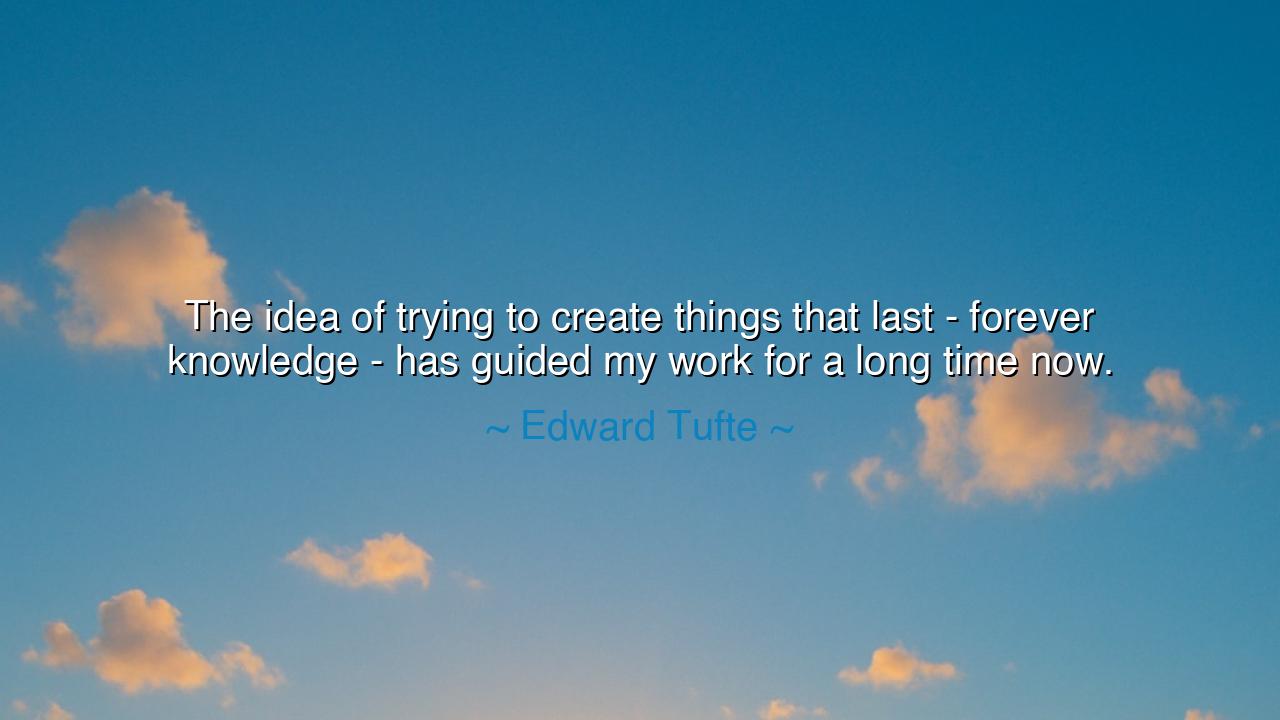
The idea of trying to create things that last - forever knowledge
The idea of trying to create things that last - forever knowledge - has guided my work for a long time now.






“The idea of trying to create things that last — forever knowledge — has guided my work for a long time now.”
Thus spoke Edward Tufte, master of clarity and truth in the language of information — a philosopher of precision who transformed the way humanity sees data, meaning, and form. In this simple yet profound declaration, he reveals a yearning that is as old as civilization itself: the desire to craft knowledge that endures, to shape something of the mind that transcends the decay of time. His words echo the voices of the ancients — the scribes who carved upon stone, the scholars who wrote by candlelight, the architects who built for eternity. Tufte reminds us that knowledge, when made with care and integrity, can outlast all monuments of stone and steel, for it belongs not to one age, but to the ages.
When Tufte speaks of “forever knowledge,” he does not mean mere information or fleeting facts. He speaks of wisdom distilled — of truth captured in form so clear and so honest that it cannot be undone by fashion or falsehood. Such knowledge, like a diamond, resists the erosion of years. It is the kind of truth that guides navigators by the stars, that teaches artists how to see, that empowers humanity to think rightly amid confusion. To create this kind of knowledge, one must work not for applause, nor for gain, but for permanence — for the moment when the work stands apart from its maker and begins to live on its own, speaking silently to generations unborn.
The origin of these words lies in Tufte’s lifelong devotion to the visual presentation of data — to the art of making knowledge visible. Through his writings, such as The Visual Display of Quantitative Information, he sought to strip away clutter and deceit, revealing truth through elegant simplicity. His goal was never the beauty of ornament, but the beauty of clarity — the union of precision and purpose. In a world drowned in noise and distortion, Tufte became a guardian of truth’s form. To him, every graph, every chart, every word that seeks to explain reality carries a sacred responsibility: to preserve truth from decay, confusion, and manipulation. This is what he means by creating things that last — works that honor the eternal laws of reason and observation.
In this, Tufte stands among the lineage of builders of immortal knowledge. Think of Euclid, whose geometry has guided minds for over two thousand years, or Aristotle, whose thoughts still ripple through the rivers of philosophy. Their words were not made for their time alone, but for all time. The beauty of their work lay not in novelty, but in durability — in their obedience to the truth rather than to the trends of men. And even beyond words, we see this longing for permanence in Leonardo da Vinci, who drew machines and studies of the human body not for profit or fame, but to uncover principles that would live forever. Such souls are kindred to Tufte: craftsmen of the timeless who believe that knowledge, once perfected, can become as immortal as light.
Yet there is a deeper message within this quote — a moral one. Tufte’s pursuit of “forever knowledge” calls upon us to resist the vanity of the age of speed. We live in a world where information burns bright and dies quickly, where novelty is worshiped more than truth. But the one who seeks to create something lasting must learn the virtue of patience. The eternal cannot be rushed. It demands discipline, humility, and love. To create knowledge that endures, one must refine thought as the sculptor refines marble — slowly, deliberately, removing every falsehood until only truth remains. The work of permanence is the work of character.
Consider the story of Isaac Newton, who once said, “If I have seen further, it is by standing on the shoulders of giants.” Newton’s discoveries were born not from haste, but from careful accumulation — from decades of reading, measuring, and reflecting. His Principia Mathematica is one of the greatest examples of “forever knowledge,” a work whose truths still govern the motions of the stars. He labored to express eternal laws in words and numbers that would never grow obsolete. Like Tufte, Newton was guided by the belief that knowledge should not perish with its author, but continue as a gift to humanity — a flame passed from mind to mind.
Thus, O seeker of wisdom, take this teaching into your heart: create what lasts. In whatever craft or calling you labor — be it science, art, teaching, or the simple acts of living — work not for applause, but for endurance. Let your thoughts be clear, your intentions pure, your creations honest. Resist the urge to build for the moment; instead, build for eternity. The words, deeds, and insights forged in truth will outlive even the memory of your name.
For as Edward Tufte reminds us, knowledge born of clarity and integrity is forever. It is the bridge between generations, the compass of progress, the song of reason that echoes through time. To labor for such knowledge is to join the fellowship of the eternal — those who, through patience and devotion, have carved light into the dark fabric of the world. Let that be your work, your offering, your legacy: to create not merely what is new, but what endures.






AAdministratorAdministrator
Welcome, honored guests. Please leave a comment, we will respond soon